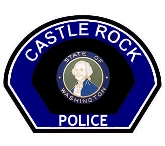
Castle Rock Police Department
Educational Resources
 |
Castle Rock Police Department Educational Resources |
DOMESTIC VIOLENCE
If you are a domestic violence victim call 9-1-1. You may also find guidance at the Emergency Support Shelter (ESS) in Kelso 24 hour crisis line (360-636-8471), or the ESS Legal Advocates (360-577-3000) for help with protection orders. The Washington State Domestic Violence Hotline number is 1-800-562-6025.
Why Get Help? The Danger is Real If you are controlling or have a controlling partner, don't ignore these behaviors. They are learned behaviors that one person uses to intimidate and manipulate. They are destructive and dangerous. Every year, thousands of women are seriously hurt or killed by their husbands or partners.
If the abuse continues without outside help, the abusing partner may risk being arrested, going to jail, or losing the relationship.
What Hurts You Hurts Your Children Children get hurt when they see their parents being yelled at, pushed or hit. They may feel scared and ashamed or think they caused the problem. Children grow up learning that it's okay to hurt other people or let other people hurt them. A third of all children who see their mothers beaten develop emotional problems. Boys who see their fathers beat their mothers are ten times more likely to be abusive in their adult intimate relationships.
Everyone Has the Right to Feel Safe in a Relationship
Disagreements develop from time to time in relationships. Domestic violence is not a disagreement. It is a whole pattern of behaviors used by one partner to establish and maintain power and control over the other. These behaviors can become more frequent and intense over time.
The abusive person is responsible for these behaviors. That person is the only one who can change them.
Don't wait until you and the ones you love get hurt. If you are in immediate danger, call 911. Does your partner:
If you experience or use any of these behaviors, you could be in danger of getting hurt or hurting the people you love.
We've learned not to let friends drive drunk. We've learned to help stop crimes. How can you approach a friend in trouble?
If you think a person is being abused:
If you think a person is being abusive:
Seek the support of caring people. They may be your friends, family members, neighbors or staff members of the agencies listed below. Talk to them in a private, safe place.
If your partner is abusive, have a plan to protect yourself and your children in case you need to leave quickly.
If you are abusive, be honest with yourself, think of the consequences, and get help.
Domestic violence occurs among all kinds of people. It cuts across cultural, economic and social boundaries.
Together we can prevent domestic violence. Friends, family members, co-workers, neighbors and other caring people can offer help that can save lives. Learn to take action. There's No Excuse for Domestic Violence |
||||||
| Other Resources: | ||||||
| Washington State Coalition Against Domestic Violence 8645 Martin Way NE - Suite 103 Lacey, WA 98516 E-mail: wscadv@cco.net Phone: 360-407-0756 FAX: 360-407-0761 TTY: 360-407-0767 A Plan For Protection From Domestic Violence (Washington Courts) |
Washington State Domestic Violence Hotline Tel: 800-562-6025 E-mail: csn@willapabay.org Web: http://crisis-support.org/ Longview Police |
|||||